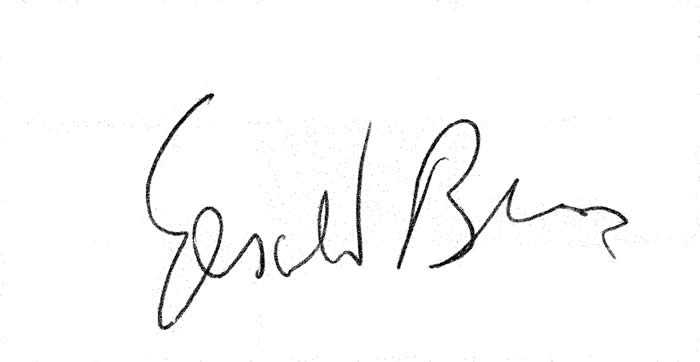
of pity enters. Anyone who writes is near hell, whatever that is. The child you
seduce for instance may be seduced. "O.J.'s really guilty, hunh?" a man
says toothily walking by, a black man, not quite compos, just being sociable,
hostility only there in the thrust of the question (as uttered, then its
gratuitousness). When Jim said the jury had decided I did not ask,
thinking he reserved it, the verdict. Apparently the judge slept on it overnight.
I didn't want to give Jim, who is leaving before the week is out, yet again the
satisfaction of seeing my irritation at his delivery. Of such tissue moral theology
used to be as we say woven. Dante uses it like some artificial gauze
you can lay over an open wound, that amalgamates with it or vanishes.
Maybe we're back to that, what is a proper subject for poetry, if
poetry after Olson may be said to have a subject rather than a theme.
The wind keeps blowing the shop sign down. It rained a few seconds in bright
sun, the way it does in Dublin. So much of our verse is observations of that sort.
I don't object to fact but don't fetishize the recording of it. "Under"
event, an under meaning you can make clear. Olson's good at taking
the individual's grasp of it as what is rendered. Subject, it seems to me,
can still be rendered the way a frog looks at a snake, both nearly
the same temperature. On the coast a bird was, she thought, teaching a
younger bird how to eat a crab, which was moving. Water in waves,
long flat waves, a fine day, came in past rocks with such distinctive
shapes they have names, are named on my travel map. I could so
refer to them, who is/Frank Moore, Frank Wilson, remembering
as I did so what they are. The beaks tear alternately at the irritable
crab. They take turns. This is how it's done. This way.
Francis Iscariot always had to be told twice. It was a flaw
in his character, one of many. It was a kind of seepage, too much
emotion directed at anything, or too little. Being white it seemed to him
like a black woman for whom for him it was a constant
readjustment or approximation, how it mattered or didn't matter
that she was black. Or a black man. The color of fingers say
on a white eraser was part of the experience and not, to
sort out, get right, getting it wrong like lighting the filter end
in the dark, disconcertion that a thing has two ends, nocking
the arrow at the flint point, frightening decline of productivity,
sudden requirement of bravery when you thought it handled.
He cracked the filter off the cigarette onehanded, in the dark,
lit the ragged end and went on talking to her, receiver
slightly moist from his palm and fingers. This was not
(he knew) the Curse of Self Awareness. In a previous life
he'd been a weaver for Gobelin, tapestries for the rich,
philosophers and goddesses, Danaids with urns pouring water
so bright, not yet dusty, groups of people caring about each other
as if gods could be friends, "I'm a goddess not your mother"
miaowing on the radio, voice velvety not brick-textured
like tapestry. He embraced previous lives, didn't mind it but
the shift in conventions made him slightly self-conscious, that voices
came over the air that you could attend to, apply to your life a different way from
saying those are Danaids, some story out of Ovid we are rich enough
to know, picture of forest trees on the wall, a calendar, representations
conventional as "taking offense" or "differing," under them all emotion never
to be mentioned or named, surge audible in seashells, viscous, salt,
or the sound of ferns harvested by mountain beavers, no more'n they need.
The question in his mind (since he had an analytic turn of mind, and a Symbolist
Anthology in his pocket) was the symbolist connection with death. He wrote
Copyright Gerald Burns 1995-1997